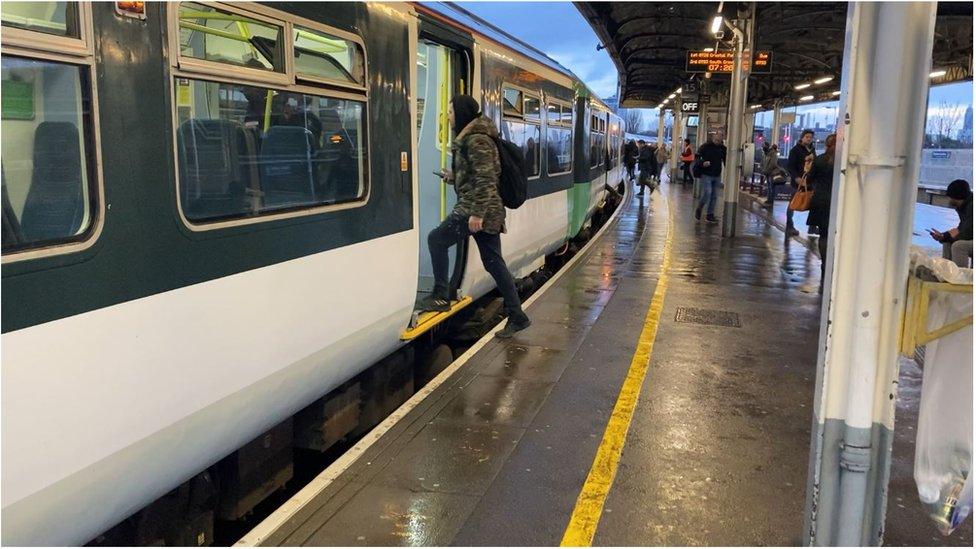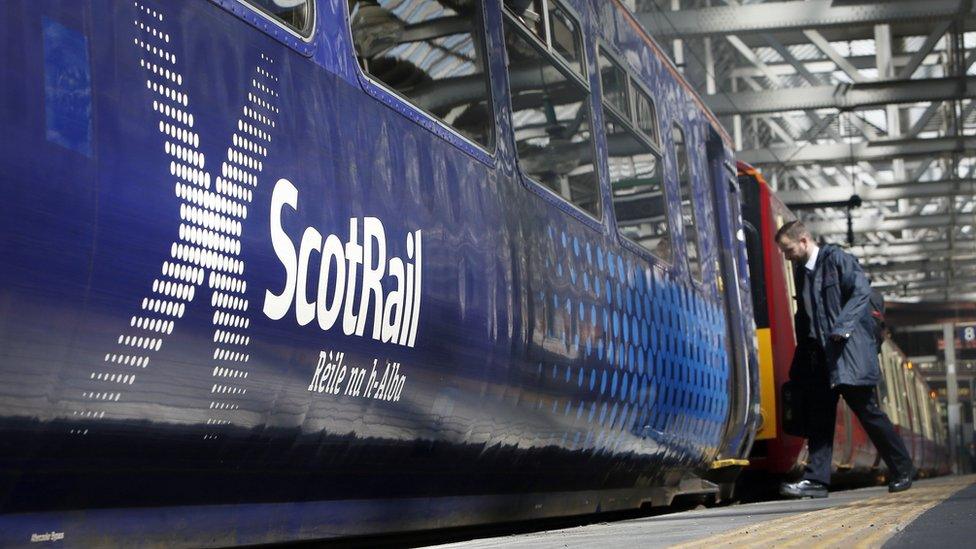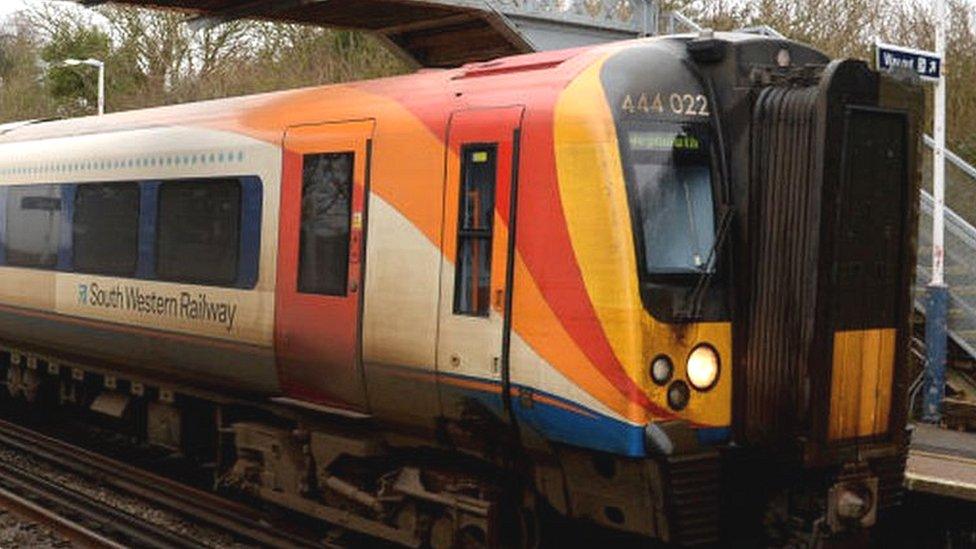Train services down by a fifth after Covid slump
- Published
- comments

More than a fifth of train services that were running before the Covid pandemic have not returned, new data provided to the BBC shows.
One month after work-from-home guidance was lifted, some commuters say they are struggling to get to work amid a lack of trains and sudden cancellations.
Train operating companies said they are starting to bring back more services.
But rail minister Wendy Morton could not guarantee that services would return to pre-pandemic levels.
The government says it has spent more than £14bn propping up the railways after passenger numbers, and ticket revenue, collapsed during the Covid pandemic.
Omicron dealt passenger numbers a fresh setback at the end of 2021, as people were again asked to work from home if they could.
Timetables across the country were cut back again over the winter which train companies blamed on high levels of staff isolation.
The Rail Delivery Group, which represents operators, says 19,500 trains are now running per day, which is equivalent to 79% of overall pre-Covid services. It says that is expected to rise to 85% by the end of the month.
The shape of the timetable beyond that is still uncertain. As commuters slowly return, deciding how many services to are needed at which times is a challenge.
The industry group points out that current passenger demand is still below the capacity available.
The latest figures from the Department for Transport show that on Monday this week, passenger usage was about 64% of pre-pandemic levels.
Leisure travel has recovered better than weekdays.
The rail industry has launched a rewards programme to incentivise commuters, and a flexible season ticket has been introduced in an attempt to adapt to changed habits.
Trains 'not frequent or reliable'

Lee Garrett and Amy Kean say their commuter services have been reduced making returning to the office difficult
But Lee Garrett and Amy Kean say the current level of rail service is putting them off returning to regular train trips into the office. They say arriving on time is proving challenging.
The couple live in Gipsy Hill, close to Crystal Palace, and commute into Central London, but many of the services they used before the pandemic have been cut.
Lee said: "There's only one train every half an hour at the moment.
"Yesterday was the perfect example. I turn up to get the one that would have got me to work on time and it's cancelled, so I am down to one an hour.
"So I have to change my plan, turn round, and work from home."
This week, that isn't too much of a problem as Lee doesn't have to be in the office. "At the moment it is voluntary. Next week when it is mandatory it is going to be a problem" Lee said. He is hoping that more services are soon added.
For his wife Amy, getting to the office on time on her mandated days is already proving difficult.
"I have people in my team from Kent and Essex and I'd say at least 25% are having problems every day.
"There are fewer trains an hour, they are very crowded, and they are randomly being cancelled. They are not as frequent or reliable."
'We are not where we were'
Recently appointed rail minister Wendy Morton said people were now working differently in a "changing landscape" with people "starting to blend home and the office". She said it was necessary to "balance the mix".
Ms Morton could not confirm that services would ever return to levels before March 2020, and said the government is "reviewing and monitoring the trains and levels of passengers.
"We are not where we were previously," she said.
Pointing to more than £14bn of taxpayer funding used to keep the railways going, any decisions would need to be "fair for passengers and fair to taxpayers as well," she added.
Rail industry insiders say that day-to-day Covid infections are still affecting their ability to run all timetabled services, with staff still off, and train operating crews short of people. They also point to interruption in driver training.
Some operators have bid to run more services that would bring them close to pre-Covid levels, but a final decision is still to be made on that.
City centre support
While passenger numbers on trains and buses are still lower than they were, road traffic has rebounded, with car journeys approaching pre-pandemic levels.
Business groups say train services need to be running to help local economies, but also to help cut pollution from car journeys.
Raj Kandola, from the Greater Birmingham Chambers of Commerce said: "We need an appropriate level of service to get people back to the office.
"To make sure they are frequenting the city centre and using leisure services.
"At the same time, we need to get people get out of their cars if we are going to reduce the amount of congestion on our polluted road networks."
'We had to cut back our plans'
Businesses who traditionally depend on rail trade are also hoping that services and commuters return.
Peter Collie owns the Horseshoe Inn near London Bridge railway station, and the Prince of Wales pub a stone's throw from Paddington station.
Trade has been 80% down during the pandemic, with the Paddington site the worst hit.
"We've lost probably 50% of the staff we had back in 2019," he says. "We've had to cut back on everything that we wanted to do."
But he believes career opportunities and social benefits will eventually tempt commuters back.
"Being optimistic, we'll hopefully be back to firing on full cylinders within two years," he says.
And some businesses say that people are now prepared to spend more money when they visit city centres, because they are only commuting two or three days per week.
Related topics
- Published9 February 2022

- Published17 January 2022
